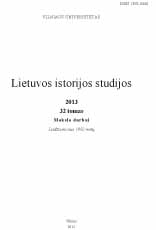LIETUVOS BAJORĖS IR ŽEMĖVALDA: NUOSAVYBĖS SANTYKIAI XIX AMŽIAUS ANTROJE PUSĖJE
Noblewomen of Lithuania and Landownership: Property Relations in the Second Half of the Nineteenth Century
Author(s): Tamara BairašauskaitėSubject(s): History
Published by: Vilniaus Universiteto Leidykla
Summary/Abstract: This article was inspired by the monograph “A Woman’s Kingdom: Noblewomen and the Control of Property in Russia. 1700–1861” (published 2002) by Michelle Lamarche Marrese. The author explored the relationship of noblewomen of the Russian Empire with the property in the eighteenth to mid-nineteenth century and made three important conclusions: (1) the noblewomen had an exceptional privilege to dispose of the property, exercised control of their land and wealth, and had more liberties than women of the Western European elite; (2) private property was the only sphere of the Russian patriarchal society where women felt equal to men; (3) the right of noblewomen to the property that had been formed to the mid-nineteenth century was codified and did not change essentially in the second half of the nineteenth century. In the historiography of Lithuania, the relationship to property of the nineteenth century women is not explored, although it is known that up to the 1840 when the Lithuanian Statute was in power, the Lithuanian and Russian law regulated the matters of women’s property, and later only the civil law of the Empire was actual. However, it was not explored how the noblewomen of Lithuania used their rights, how they fought for property and treated it. The article reveals how in the second half of the nineteenth century to the early twentieth century noblewomen landowners (first of all of the Polish origin) of the Kaunas and Vilnius gubernias created their relationships with the private property in the form of estates and land. Research sources include applications of noblewomen to the local and central authorities, correspondence of various governmental institutions on the issue of landownership, court files, and other legal documents. Based upon them, the conclusion was made that noblewomen owners of estates and land, who might comprise ca. 14–17 per cent of all landowners in the Vilnius and Kaunas gubernias, had the majority of male rights to property. Noblewomen had to keep the order of priority of succession and inherited less than men; however, this did not force them to treat their estate and land in a different way than men did. Property interests of men and women of the privileged class and their treating of real estate were surprisingly similar. For both, it was relevant to keep the wealth, to increase it, and to transfer it to the descendants. Noblewomen landowners did not feel special limitations to take part in property transactions personally or through assignees. They signed contracts, undertook financial obligations, dealt with matters on their behalf. Noblewomen administered their own estates on their own account and treated them in the same way as men: they could buy, sell, rule, donate, rent, mortgage, lend, place to the disposal of other persons, leave to the husband, children or relatives.
Journal: Lietuvos istorijos studijos
- Issue Year: 2013
- Issue No: 32
- Page Range: 84-98
- Page Count: 15
- Language: Lithuanian

